Why do I feel lonely when I have friends?

It shouldn’t shock you that we’re lonely. We’re years into a global pandemic, and even before so we were in the midst of a “loneliness epidemic.” In 2023, the U.S. Surgeon General Dr. Vivek Murthy sounded the alarm on the loneliness epidemic, stating that, “approximately half of U.S. adults reported experiencing measurable levels of loneliness” before the onset of COVID. In the last few years, loneliness has only been exacerbated by our current reality.
On Google, the search “why do i feel lonely when i have friends” soared 300 percent in the last year, according to Google Trends. Initially, this doesn’t make sense; shouldn’t the existence of friends mean you don’t feel lonely? According to friendship and communication experts, not in the slightest.
What is loneliness?
First, let’s establish what loneliness is. Loneliness can either be a chronic situation that lasts months or years, or it’s a temporary, momentary feeling, explained professor of communication studies at the University of Kansas, Jeffrey Hall.
Hall, who specializes in relationships and social interaction, says loneliness can be a healthy response to the feeling of disconnection. If you have good connections, loneliness may be a temporary feeling, Hall said, “because that is exactly the body’s way of telling you to take action to connect.”
We have a misunderstanding that loneliness is something to be avoided, or that it’s a feeling you shouldn’t have. But longing for friends is adaptive and healthy, according to Hall, and it’s something that makes you work to keep friends close to you.
Social media and loneliness
“Social media” is inherently social, right? For years, people have been saying the opposite: That social media sometimes isn’t very social at all.
Passive social media use — scrolling, not directly interacting with anybody — is linked to higher levels of loneliness. If you already feel lonely and see other people out and about on Instagram stories, you’re probably going to feel worse after that.
The highlights people share on social media may give you an idea of what an “ideal” relationship is. “People feel lonely when they perceive there’s a discrepancy between their actual relationships and what they perceive to be ideal relationships,” said Amanda Holmstrom, professor in the Department of Communication at Michigan State University. “So, we can have friends but still feel like those friendships aren’t ‘ideal.'” Holmstrom’s work focuses on communication of social support in relationships and how that impacts wellbeing.
Assistant professor of communication studies at Colorado State University, Natalie Pennington, encourages focusing on the active parts of social media, like commenting on posts or DMing someone.
Still, chatting over social media may not cure your loneliness. In a paper, Hall and Pennington, as well as UC Santa Barbara professor Andy Merolla, found that social media use didn’t promote connection or decrease loneliness. “Being digitally surrounded by people is not a useful way to get over loneliness,” Hall told Mashable.
Increased technology has, at the same time, enabled us to not show up for our friends (canceling plans is just a text away), while entrapping us to respond to many connections that weren’t possible pre-social media.
Why do I feel lonely when I have friends?
“It’s absolutely possible to feel lonely when you have fantastic friends,” said Hall.
Pennington identified three reasons why one might feel lonely when they have friends: they don’t live close to their friends; they don’t spend time with them; or they don’t feel close to them.
“It’s absolutely possible to feel lonely when you have fantastic friends.”
The first one is self-explanatory. Maybe you made friends in college and you all moved to separate locations after graduation, or you don’t live near your hometown, childhood friends anymore.
Even if friends are nearby, though, there are reasons we don’t spend time with them. “Especially in adulthood…we have competing obligations, like work or family — and those things increase as we get older — which is why our friendship networks get smaller,” Pennington explained, “and we just don’t have time for them as much as we used to.”
Pennington, whose research centers around friendship and meeting social connection needs, said this is a product of life stage more than the current time period we’re living in. But political, societal, or governmental factors can play a role as well.
“People are generally happy with the number of friendships they have, but less happy about how they are able to maintain them,” said Holmstrom.
And, since the pandemic, we’ve been spending a lot less time for other people. Perhaps you’ve gone back to the office, but many people are still working from home and have much fewer day-to-day social interactions.
“People are still feeling the aftershock effects of trying to figure out how to reorganize their social life” in the wake of the pandemic, Hall said. Many people aren’t isolating due to COVID anymore (though others are, and the World Health Organization still categorizes COVID as a pandemic), but it’s undeniable that our lives have been impacted by lockdowns and extended remote work.
“We’ve become accustomed to loneliness,” Hall continued. “We’ve become accustomed to a lot less social stress, a lot less opportunities to be around other people.”
Hall developed the communicate bond belong (CBB) theory, which states that people balance their energy for social interaction with their need to belong. When we meet new people especially, it requires more energy from us to create meaningful connections. If you’re not used to being around people — and you’re exhausted from all the other tasks in your life — the amount of energy you have for new and existing friendships drops.
In the last few years, our baseline for societal interaction fell too, which has led to a “societal inertia,” Hall said. “We’re accustomed to less [interaction], and then we’re like, ‘Man, I feel lonely.'”
How to feel less lonely
While social media won’t help loneliness, other forms of connection will. In fact, Hall encourages people to respond to their loneliness by taking action.
Face-to-face interaction is unsurprisingly the best way to feel less lonely, according to Hall, Pennington, and Merolla’s research. This is especially true if you know the people you’re around well. It goes back to the CBB theory: you’re getting that need to belong met, and you’re energized by being around people who know you.
If in-person interaction isn’t not possible, schedule a phone call with a friend or loved one.
“Phone calls appear to be the most superlative form of distance communication compared to anything else right now,” Hall said. This remains consistent in research now as well as that before social media. Lower down in the “ladder of communication” is video chatting; texting; group texting; and social media and email towards the bottom.
Maybe you’re in the habit of not answering messages, or not following up with people. It’s understandable especially given the entrapment of being beholden (or at least thinking you are) to responding to texts, emails, Slack messages, DMs…the list goes on. But we can practice the skill of returning the text, or following up and asking to have a phone call. You can build it into your routine, if you have the capacity to do that.
This is especially true if you’re friends with someone who feels lonely and disconnected themselves. “Making sure that you’re more responsive to the people who are struggling is actually a very good thing to do,” said Hall. “If you have more, you should give more.”
If you’re chronically lonely — which begets depression and vice versa, Hall said — then getting out of that can be more difficult. If you’re highly anxious or depressed, seek professional help if possible. You don’t need to pressure yourself to increase your social interactions; give yourself grace.
Know that you can feel closer to your friends in just a few minutes every day. In research done by Hall, Holmstrom, and Pennington, they found that just doing one small action with a friend over the course of a day increases people’s wellbeing. These actions don’t take much time and are pretty attainable, said Holmstrom: joking around, practicing careful listening when a friend talks, or offering a friend a sincere compliment.
“One thing I’ve been doing lately is reaching out to some of my childhood friends when I remember something fun or funny we’ve done in the past,” Holmstrom said. “I remind them of that time and how important that memory is to me. Though I can’t speak for them, I do know that it makes me feel connected with them and like I’m keeping our friendship alive, despite our hectic lives and geographical distance.”

